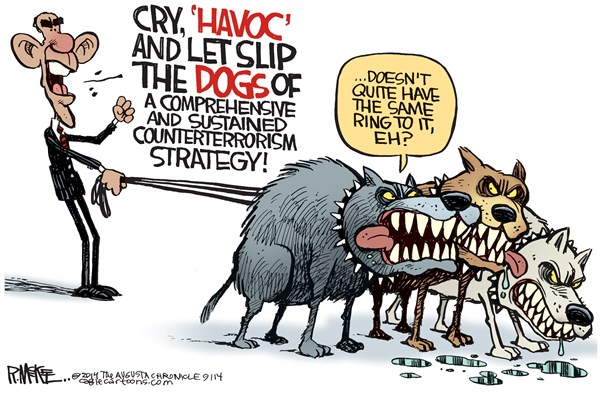
I joined the Marines during the war in Vietnam. Many veterans of that era think it was lost because of the political constraints President Lyndon Johnson imposed on military operations.
After 56 months of stalling in the Paris peace talks, the North Vietnamese agreed to a cease fire that preserved existing borders. We got the deal we’d sought all along — a tie — only because of the 11 days during the U.S. decade in Vietnam in which we used military power the way it is supposed to be used. That was when B-52s dropped 15,237 tons of ordnance on 32 critical military and industrial targets during Operation Linebacker II in December 1972. After 11 days, North Vietnam’s ports were blocked, its rail system was in shambles, 80 percent of its electric power grid destroyed.
“You had won the war,” said British counterinsurgency expert Sir Robert Thompson. “They had fired 1,242 [surface-to-air missiles]. They had none left. They … were at your mercy. They would have taken any terms.”
We could have achieved a tie, with fewer casualties, at any time in the eight years preceding. Most of the 47,424 Americans killed in Vietnam died needlessly. And, as it turned out, Saigon fell two years after the Paris agreement when Congress reneged on the commitment we’d made to help the South repel an invasion from the North.
The main problem was that LBJ had ordered on-again, off-again pinprick air attacks on nothingburger targets in North Vietnam to “send a message.” The message North Vietnamese leaders got was the Americans wouldn’t seriously harm them.
Half measures in war end badly. Politicians decide whether to go to war and set strategic objectives. But political constraints on tactics diminish the effectiveness of military action. To send messages, you use Western Union, not the Air Force.
President Barack Obama has decided to wage a preemptive war, sort of, on the vicious terrorists of the Islamic State more to mollify domestic critics than to deal with the threat the Islamic State poses. The methods by which he plans to fight poll well, but military experts say they have zero chance of success. And because Democrats don’t want to be on record supporting Iraq War II, The Mulligan, he planned to wage war without authorization from Congress.
House Minority Leader Nancy Pelosi, D-Calif., compared the war against the Islamic State to the war on drugs, a comparison of such stupendous stupidity it is topped only by the assertion of the Democratic Senate candidate in Kentucky that ballistic missile defenses work in tunnels.
An unfortunate consequence of the end of the draft is that few of our elites have a clue about what can and can’t be accomplished with force. This is (nearly) as true of neocons — with their touching faith in “nation building” — as it is of liberals.
War isn’t prevented by mouthing platitudes such as “nothing is ever settled by violence.” History tells us that major disputes between nations and peoples and creeds are regularly settled by violence.
Because war is dreadful, we should go to war only when a vital interest is threatened. If we aren’t willing to do what it takes to win, we shouldn’t wage preemptive war.
To win — better still, to deter — war, we need a strong military. The time to build it is before war starts.
The strength of our armed forces has cosseted us from danger, but it’s been squandered. In view of the chaos in the world today, the defense cuts President Obama plans are insane. So is sending 3,000 troops to Africa to “fight” a disease.
In dribs and drabs, Mr. Obama has sent more than 1,600 troops back to Iraq — enough to entangle, not enough to win.
The only thing more dangerous than ignoring a vicious and determined enemy is to strike just hard enough to annoy him. As Sen. Ron Johnson, R-Wis., put it, the “strategy” President Obama outlined to fight the Islamic State — geared to meet his political rather than our security needs — is like poking a hornet’s nest with a stick.
Comment by clicking here.
JWR contributor Jack Kelly, a former Marine and Green Beret, was a deputy assistant secretary of the Air Force in the Reagan administration.



 Contact The Editor
Contact The Editor
 Articles By This Author
Articles By This Author